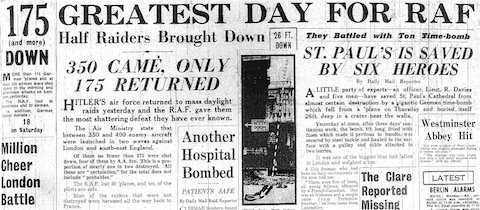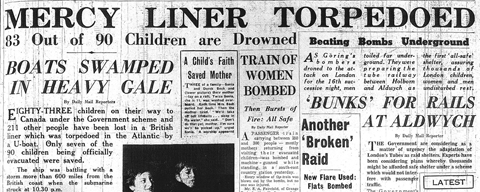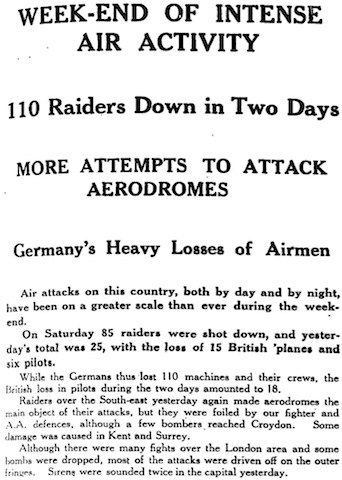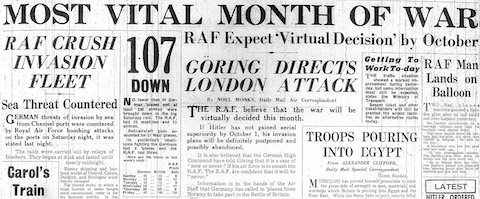
There’s no doubt what’s newsworthy today. The Daily Mail trumpets the big battle over the Home Counties yesterday, the ‘most shattering defeat’ the Luftwaffe has ever experienced (1):
The Air Ministry state that between 350 and 400 enemy aircraft were launched in two waves against London and south-east England.
Of these no fewer than 175 were shot down, four of them by A.A. fire. This is a proportion of nearly one in two destroyed. All these are “certainties,” for the total does not include “probables.”
The R.A.F. lost 30 ‘planes, and ten of the pilots are safe.
A million Londoners are said to have seen the battle overhead, some of whom saw the first enemy aircraft to fall on central London:
A German bomber, with a Spitfire in pursuit, fell out of the clouds and hurtled down in flames, crashing in a busy spot in the Central London area.
Those who were in the open set up a cheer for our fighters.
People flocked out of the shelters to see what it was all about. And they joined the cheering.
A later headline asserts that ‘London is world’s greatest city’. As proof it offers the way in which the capital, despite being ‘bombed and harassed by Hitler’s hordes, is still Going To It’:
The typists, the clerks, the office boys, and the directors are still arriving at their offices every morning, the shop girls are still arriving at the stores, fresh and eager for work after a good night’s sleep in the shelters.
If their trains and buses fail them, they are getting lorry lifts to work or leaving home extra early to be at their desks and counters on time.
If they cannot get to and from their work easily enough, they are sleeping at their work.

Other items of interest: a rather forward-looking article by veteran war correspondent G. Ward Price on how Britain can invade Europe (2); R. A. Saville-Sneath explains how the Ju 88 and the Bristol Blenheim can be distinguished from one another; and the introduction of pay-as-you-earn income tax is described as the ‘Chancellor’s Blitzkrieg’ (5).
By comparison with yesterday’s air battles, the Mail doesn’t talk much about invasion, aside from assurances that the RAF is still hitting the invasion ports hard. It’s the other way around with today’s Home Intelligence report. About all it says is, in the opening sentence of its summary, that ‘Yesterday’s aerial successes have produced enthusiastic praise for the RAF’. Then there’s a whole paragraph on invasion rumours: ‘Most people’ think an invasion will come soon, in a few days, but equally they are ‘very confident’ that it will fail. In fact, there are rumours that it has already been attempted and repulsed:
From Nottingham comes the rumour that German bodies have been floating in the Channel. In North Nottinghamshire the invasion is said to have been attempted on Lincolnshire and the South Coast. In Northampton it is said that the attack was launched on the West Coast. Invasion rumours are also reported in the South-Western Region and Scotland.
As for Londoners Going To It, here’s a slightly less cheery view. Admittedly,
The people of London are in the great majority more optimistic, but unplanned evacuation of the ‘jittery’ to Bucks., Berks., Herts., Oxford and Kent continues. These evacuees magnify their adventures and the amount of destruction in London, thus alarming people in Reception Areas. Nightly migrations to public shelters which people regard as safe in the West End and London are now routine events. Tubes are also being used as shelters.
I’ve suggested before that Home Intelligence may have been predisposed towards bad news. Given this bias, civilian morale actually looks pretty healthy at the moment.
![]() This work is licensed under a Creative Commons Attribution-NonCommercial-NoDerivatives 4.0 International License.
Permissions beyond the scope of this license may be available at http://airminded.org/copyright/.
This work is licensed under a Creative Commons Attribution-NonCommercial-NoDerivatives 4.0 International License.
Permissions beyond the scope of this license may be available at http://airminded.org/copyright/.




Apparently, from a quick check, the actual German losses were 60 aircraft (3x overclaim) and the British lost 26 with all of 11 Group employed, hence a climax of the battle view (in hindsight of course).
18/08 saw the heaviest fighting. It seems to me that what makes Battle of Britain Day different is the contrast with last weekend. On 7 September, the interception was muffed, and the drawing down of London’s AA defences to cover air bases was painfully apparent in the Home Intelligence reports. As Brett’s blow-by-blow makes clear, discussion of this did not get into the press, but the heavy emphasis that the Press put on the restored power of the barrage on the 15th, and its morale effect, makes it clear that the point was not missed.
The sight of German aircraft being shot down over London, and the obvious intensity of the air combat was also a contrast. Coming off a three-day weather-induced standown, Fighter Command was eager to fight. And, of course, the pilots did not want to let London down again.
One might almost expect the emergence of a narrative in which the suffering of 7 September was a necessary sacrifice preparing the way for the victory of the 15th.
Is there such a narrative, though, Erik? It seems to me that most accounts of these weeks split into the ‘Battle of Britain’ narrative or the ‘Blitz’ narrative; they acknowledge the presence of the other narrative but they’ve got their own story arcs.
Sure, Brett. But doesn’t the Battle of Britain narrative end with the victory of the 15th, so you have accounts of the “forgotten months” of the Battle of Britain?
Having seen the day-by-day develop in the last few weeks here and elsewhere, I’ve also been drawn into the argument about the relative strengths of the two sides. My basic position is that the RAF was the stronger of the two forces, seeing off a German attack that was anyways too ambitious.
That said, the economic damage done on the 7th was horrendous and it is hard to argue that the air defence was not negligent. (Hard, but not impossible. I would defend it, if tasked.) By positioning the attack on London as a grievous error on the Germans’ part, relieving pressure on the RAF, one manages to argue both that this was a David-versus-Goliath victory, and excuse ADGB for a perceived fumble.
Of course, once we admit that the RAF was stronger than the German air force, we open a real can of worms. Why did the Allies lose the Battle of France, again?
In the context of a battle over the south-east of England the RAF was surely stronger than the Luftwaffe. But I’d take the idea of the German attack being ‘too ambitious’ a step further. What were its ambitions anyway? It surely lacked any clear strategic direction.
You think they’d have realised they needed a team of academics to sort it all out, really.
At first it’s a tempting thought – in that it ought to have saved a great deal of blood and treasure.
But alas! It surely wouldn’t have taken them long to come to blows.
It surely lacked any clear strategic direction.
“The history of the German war effort from 1939-1945 is one of operational brilliance in the service of strategic incoherence. Discuss.”
Erik:
Okay, but the ‘suffering’ of London is only emphasised in the Blitz narrative, it’s passed over in the Battle of Britain one. Perhaps it’s assumed, but they don’t talk much about what happened on the ground.
Alan:
‘Yes’ would be a succinct answer, but I suspect a failing one.
Pingback: Airminded · Friday, 20 September 1940